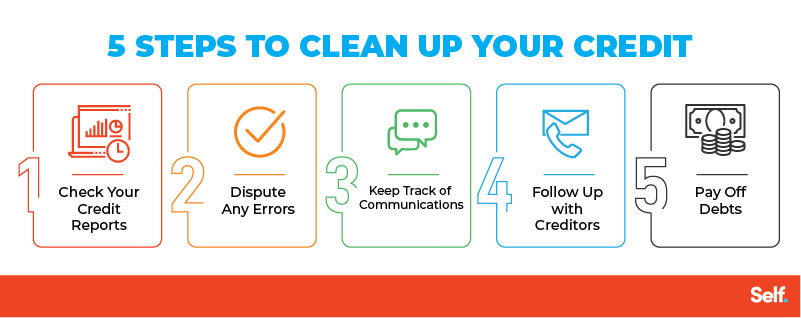how to clean up your credit
How To Clean Up Your Credit in 5 Steps

By Lauren Bringle, AFC®
Improving your credit score by cleaning up your credit report can benefit you in many ways. You can clean up your credit by checking your credit reports, disputing errors, following up with creditors and paying off your debts.
Having good credit can help you in buying a house, renting an apartment, taking out a personal loan, applying for a mortgage, leasing a car, or obtaining a credit card. The better your credit score is, the better chance you'll have of obtaining a loan or line of credit, or lowering your interest rates.
Even a single error on your credit report can negatively impact your credit score for years to come. On the other hand, cleaning it up could lift your credit score in the long run. You can follow these steps as you set out to rebuild your credit.

1 - Check your credit reports
First off, it's a good idea to check your credit by requesting a free annual credit report from each of the three major credit bureaus: Experian, Equifax and TransUnion. Credit bureaus gather credit information on your borrowing, debt and payment history. They use this information as a basis for creating credit reports.
Credit reports are different from credit scores. Credit bureaus use either your FICO score (FICO® is short for Fair Isaac Corporation) or your VantageScore (which uses another, similar method of calculation), plus their own supplementary info in compiling reports. Both credit reporting agencies use scales that range from 350 to 850, but with different breakdowns.[1]
The information used to calculate a credit score includes your payment history, credit utilization and the amounts you owe, how long you've been using credit, the mix of credit types — student loans, credit cards, car loans, etc. — and the amount of new credit you've got.
The good news is, you have access to all this information: Under the Fair Credit Reporting Act, you can obtain a free copy of your credit report once a year at annualcreditreport.com. You'll need to provide your name, address, Social Security number and date of birth. If you've moved in the past two years, you also may be asked to provide your previous address.
It's a good idea to get a free credit report a few months before you apply for a major loan, purchase insurance, or apply for a job (since many employers will take note of your credit history). That way, you'll know whether you have a good credit score or a poor one while you still have time to address any errors or negative items and dispute them if necessary. Learn how often credit scores update so you can determine how far in advance to start working on improving your credit history.
Spotting inaccuracies is important also because identity theft can damage your credit, as well. Thieves use scams to obtain personal information, which they can use to open a line of credit in your name, then make charges and refuse to pay the bill. To combat this, be sure you don't see drastically higher account balances on your report than you typically carry.
But it isn't just items in your payment history that are worth considering. It's always possible that another person's information has been included in your account by accident, especially if you have similar names. It's a good idea to check your name, phone number, address, account status, current balance and credit limit to make sure they're all accurate.
Even minor inaccuracies can lower your credit score, so it's helpful to check for any mistakes in your credit report. Also be on the lookout for other factors that can affect your credit score, including home loan foreclosures and high credit card debt, and be sure you don't have any late or missed payments.
2 - Dispute any errors
Having an error on your credit report is more common than many might think. According to a 2012 study by the Federal Trade Commission (FTC), about one-quarter (around 25%) of Americans have an error on their credit report.[2] A follow-up study three years later found that nearly 70% continued to believe that at least some inaccurate information remained on their reports.[3]
Half of those who were dissatisfied said they planned to abandon their dispute. That's just another good reason to start the dispute process as soon as possible, as disputing might take time and perseverance. Try to stick with it because the damage done to your credit won't be erased if you don't take action. The credit repair process will only get harder the longer you wait.
If your dispute is rejected and you think there's still something wrong, backtrack to see if you've done anything that could have triggered the negative information. If you find you have, contact your creditor and set up a plan to catch up on your payments, while asking the creditor to stop reporting missed payments.
If you're still having difficulty, another option is to call in a nonprofit credit counseling service to help. That doesn't mean enlisting a shady credit repair company that offers unrealistic guarantees and quick fixes based on unscrupulous shortcuts. There are many legitimate credit counselors who can help you over the phone at little or no cost.
3 - Keep track of communications and reports
As with any legal or financial process, it's important to keep track of all forms of communications you have with credit reporting bureaus and/or collection agencies.
As part of this process, you should collect all documents that support your claim; bank statements, credit card statements, or emails.
Keep track of all of your communications with credit bureaus and creditors to make sure that the dispute is indeed filed appropriately. This is important because the person making the dispute is responsible for making sure it gets filed and that they've taken all the action necessary to clean up their credit.
4 - Follow up with creditors
As the FTC survey above makes clear, disputes aren't always resolved right away. That's one reason it's important to keep in touch with your creditor and the credit bureaus and have dates and names handy for discussing the next steps in the process.
Following up with credit bureaus and creditors is also necessary because it helps you make sure you've left no stone unturned in your quest to clean up your credit. Remember that if your claim is denied by a bureau or lender, you can still file a statement to take action with the FTC.
5 - Pay bills on time and pay off debts
Working to rebuild your credit little by little is the last important step you can take in the cleanup process to take control of your personal finances.You can start improving your credit once you've cleared up any mistakes or issues that appeared on your credit reports. Here are several issues to watch out for:
Avoid late payments and make sure none of your payments are past due. If they are, it's important to pay them off promptly, then monitor your credit card balances and personal loans so that you never miss a payment again. A payment more than 30 days past due is considered a delinquency and can be reported as late to credit bureaus. If you find yourself in this situation, learn how to remove late payments from your credit report.
Applying for too many loans in a short space of time isn't generally a good idea. Each time a lender gets a request from you, they'll most likely perform what's called a hard inquiry or "hard pull" to check your credit. (Don't worry, checking your own credit report doesn't affect your credit score.)
If you have a record of too many credit inquiries, it can reduce your chances of obtaining a loan because credit card issuers and other lenders will suspect you're trying to compensate for a lack of cash and think of you as a bad risk.
It's helpful to keep this in mind when considering a balance transfer to a lower-interest credit card. A balance transfer can be a good idea if you use it to get your debt under control, since the size of your debt accounts for 30% of your FICO® score. If you can get a 0% annual percentage rate for six or 12 months, that can give you time to pay down your debt without accumulating more interest.
However, if you make too many requests for new credit cards, lenders will take notice. And remember that a balance transfer won't reduce the amount of money you owe; it will merely keep more interest from accumulating for a limited time.
Another positive step to take is to maintain a low balance on your credit cards, so you have ample available credit. Maintaining a high balance near your credit limit can be a red flag signaling that you aren't a good risk.
If you've had a tendency to overextend your credit in the past, one way to keep yourself from doing so again — and to begin rebuilding your credit — is through a secured credit card. It's "secured" by a sum of money you deposit into an account, which usually ensures you can't spend more than that amount. The security deposit acts as a credit limit for you and insurance that you can pay what you owe.
And, of course, stay on top of your credit by monitoring your reports and scores regularly.
Bad credit isn't forever, and credit rebuilding doesn't have to be a mystery. It does, however, take patience and diligence to ensure that you're on the right track and that the credit bureaus haven't made any errors.
By monitoring your credit score, keeping track of your credit history, paying your bills on time and staying in touch with your lenders to resolve any credit disputes you may have, you can clean up your credit and move forward.
Article Sources
- Self Financial. "How are credit scores calculated?" https://www.self.inc/learn/how-credit-score-calculated. Accessed April 15, 2021.
- Federal Trade Commission. "In FTC Study, Five Percent of Consumers Had Errors on Their Credit Reports," https://www.ftc.gov/news-events/press-releases/2013/02/ftc-study-five-percent-consumers-had-errors-their-credit-reports. Accessed April 15, 2021.
- Federal Trade Commission, "FTC Issues Follow-Up Study on Credit Report Accuracy," https://www.ftc.gov/news-events/press-releases/2015/01/ftc-issues-follow-study-credit-report-accuracy. Accessed April 15, 2021.
Lauren Bringle is an Accredited Financial Counselor® with Self Financial – a financial technology company with a mission to increase economic inclusion by helping people build credit and savings. Connect with her on Linkedin or Twitter.
how to clean up your credit
Source: https://www.self.inc/blog/how-to-clean-up-your-credit
Posted by: hillsidia1949.blogspot.com

0 Response to "how to clean up your credit"
Post a Comment